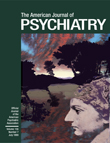Olanzapine-Induced Neuroleptic Malignant Syndrome With Mental Retardation
Mr. A was a 21-year-old black man with mild to moderate mental retardation believed to be related to the meningitis he suffered as a child. He had been treated for several years with low-dose haloperidol for behavioral difficulties and, as a result, suffered from abnormal dystonic and dyskinetic movements. On two previous occasions, he met the criteria for probable neuroleptic malignant syndrome, with creatinine kinase level elevations to 12,000 U/liter on one occasion and 1,000 to 2,000 on the other.Mr. A’s medication regimen consisted of clonazepam, 1 mg/day, benztropine mesylate, 1 mg/day, and lorazepam as needed because a trial of tetrabenazine had failed. He was then started on a regimen of olanzapine. The dose was gradually increased to 12.5 mg over a 12-day period, in which some decrease in agitation and improved behavior were noted. On day 13, Mr. A became extremely agitated and had an increase in abnormal movements as well as mild rigidity. Olanzapine was immediately discontinued. His rectal temperature rose to 40.6°C and was measured on another occasion as 40.2°C. His creatinine kinase level rose to 6030 U/liter (normal range=20–195), and his WBC count rose to 17.4×109/liter (normal range=4–11). Tachycardia (124 bpm) and hypertension (systolic pressure=150 mm Hg, diastolic pressure=100 mm Hg) were also recorded. These met the criteria for neuroleptic malignant syndrome (2).We treated Mr. A with oral liquid diazepam to help control his extreme agitation, which appeared to be the predominant symptom, along with his dystonic and dyskinetic movements. We also administered dantrolene, 50 mg/day. His creatinine kinase level values had decreased to 393 U/liter by day 6 and had returned to near normal (208 U/liter) by day 8. Any attempt to decrease his dose of dantrolene resulted in an increase in his creatinine kinase level, his WBC count, and temperature. Mr. A had risk factors of extreme psychomotor agitation (5) and mental retardation (6). Our choice of treatment with oral liquid diazepam was indicated because of Mr. A’s extreme agitation (7).
References
Information & Authors
Information
Published In
History
Authors
Metrics & Citations
Metrics
Citations
Export Citations
If you have the appropriate software installed, you can download article citation data to the citation manager of your choice. Simply select your manager software from the list below and click Download.
For more information or tips please see 'Downloading to a citation manager' in the Help menu.
There are no citations for this item
View Options
View options
PDF/ePub
View PDF/ePubGet Access
Login options
Already a subscriber? Access your subscription through your login credentials or your institution for full access to this article.
Personal login Institutional Login Open Athens loginNot a subscriber?
PsychiatryOnline subscription options offer access to the DSM-5-TR® library, books, journals, CME, and patient resources. This all-in-one virtual library provides psychiatrists and mental health professionals with key resources for diagnosis, treatment, research, and professional development.
Need more help? PsychiatryOnline Customer Service may be reached by emailing [email protected] or by calling 800-368-5777 (in the U.S.) or 703-907-7322 (outside the U.S.).

